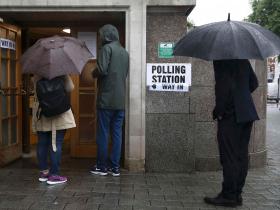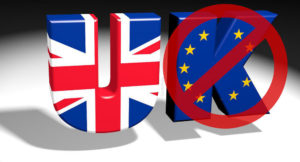My boys and I have been watching some good soccer lately, with both the Copa América and UEFA Euro 2016 in full swing. In soccer, accidentally kicking the ball into your own goal is called, fittingly, an ‘own goal.’ It is almost always embarrassing and never helpful.
Did Britons score an economic ‘own goal’ when they voted yesterday by a margin of 51.5% to 48.5% to leave the European Union after 43 years of membership? Did they vote themselves a permanently lower standard of living?

In the weeks leading up to the referendum, markets had become convinced that Britain would vote ‘Stay’ to remain part of the EU. Thus, financial markets were shocked when the votes rolled in overnight, and the economic fallout was swift and harsh. The British pound nosedived from being worth $1.50 to $1.35 overnight, reaching its lowest level since 1985. U.K. stocks dropped 3% while the Stoxx Europe 600 Index shed 7%. The weather happened to be inclement in the British Isles on vote day, perhaps keeping some overconfident and less fervent ‘Stay’ voters inside. Amazingly, 30% of the electorate did not bother to cast their votes on this incredibly important economic issue.

In Britain and in continental Europe, there is a palpable sense of fear and frustration with the status quo over the wave of immigration from the Middle East and Africa, terrorism, and economic stagnation. Politicians on the ‘Leave’ side of the campaign thus had fertile ground to pound home their message: that Britons would be better off not having to heed rules hashed out in Brussels by unelected European bureaucrats and that membership to the E.U. was having a detrimental impact on Britain’s security and economy.
Will average Britons be better off a few years down the road? Of course no one knows the answer to that now, but in the meantime there is almost certainly some serious economic pain to come. Overnight, travel to the U.S. and to Europe has become 10% more expensive for Britons. Those going to the continent for holiday to get a bit of sun this August will find their budgets pressed. With the pound’s diminished value, U.K. exporters may experience a boost in business, but those who need or want goods from Europe or the U.S. will have to swallow much higher costs. London, which is currently neck-and-neck with New York as the world’s top financial center, will likely lose influence in the coming years to other European financial centers such as Zurich, Geneva and Frankfurt.
What does Brexit mean for U.S. investors? In times of global stress, the U.S. markets and currency serve as a safe haven for jittery global investors. Fittingly, our dollar is up strongly today. So are our high-quality bonds. In the near term, however, riskier U.S. financial assets such as stocks will likely be volatile as traders react to the new uncertainties in Europe. Brexit also means that the risk of the Federal Reserve hiking rates is off the table for at least several months—if not all of 2016. Thus, U.S. interest rates are likely to remain lower for longer and will serve to underpin our healthy domestic real estate prices and consumer consumption.
U.S. companies that do significant business in Britain will face earnings headwinds, as British customers will have diminished buying power and as profits earned in pounds sterling will translate back to fewer dollars. Of our industries, banking probably has the most exposure, and the most to lose, from an economic downturn in Britain. The U.K., however, only accounts for about 3% of total U.S. exports.
Perhaps Britain’s decision to leave the EU will eventually prompt other EU members to do the same. However, Brexit will, at the very least, serve as a real-life experiment on what happens when a major economy moves to isolate itself from global markets and trade. Other countries thinking of doing the same will be watching the impact on Britain closely.
For anyone who has been contemplating a summer trip to Britain, this might be a good year to go!
Please contact us if you would like to schedule a time to discuss Brexit and its implications for the markets and your portfolio.
Peter Thoms




